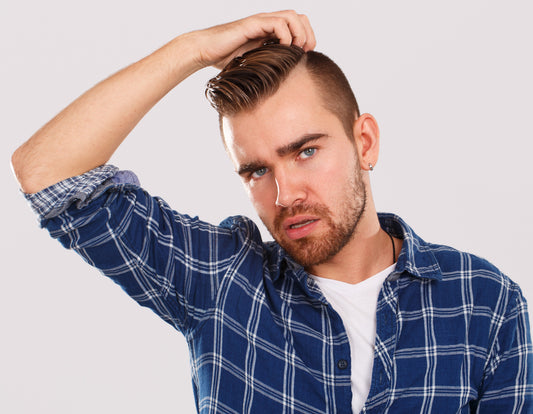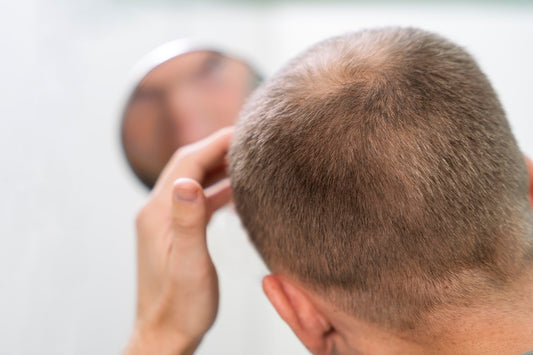A full, vibrant head of hair is a symbol of beauty, health, and overall well-being. Beyond mere aesthetics, a healthy head of hair acts as a testament to how we care for our bodies. According to Madeline R. Vann, MPH (through Everyday Health): You can often tell the health of a person based on how healthy their hair is.
This may be why seeing our luscious locks thin out can often cause deeper psychological effects.¹
With how precious our hair can be, it’s important to know how we can keep it healthy and strong. While there are many serums, shampoos, and treatments for thinning hair, one we seldom think about is how crucial our nutrition plays in keeping our hair (and scalp) healthy and youthful.
Proper Nutrition: Your Path to Lustrous Locks
If you’d like to know what vitamins and minerals (collectively “micronutrients) are essential for keeping your hair robust and vibrant, then you’re in the right place. Delve into the science-backed facts and discover how you can tweak your diet to help you get and keep the hair of your dreams.
So, let’s dive right in!
1. Vitamin A: The Foundation for Healthy Hair
You’ve probably read before that vitamin A helps keep your vision clear, which is true. But did you know that it also regulates the hair growth cycle? According to a study by Christine A. VanBuren and Helen B. Everts:
“Vitamin A is a fat-soluble micronutrient necessary for the growth of healthy skin and hair. However, both too little and too much vitamin A has deleterious effects. Retinoic acid and retinal are the main active metabolites of vitamin A. Retinoic acid dose-dependently regulates hair follicle stem cells, influencing the functioning of the hair cycle, wound healing, and melanocyte stem cells.”²

When it comes to dietary sources of vitamin A, you can mostly get it from fruits and vegetables. Rich sources include green leafy vegetables (like kale, broccoli, and spinach), orange and yellow vegetables (like pumpkin, carrots, and sweet potatoes), tomatoes, red bell pepper, cantaloupe, mango, as well as milk, fish oil, and eggs.
Do note that getting too much performed vitamin A (from supplements and certain medications) can be harmful.³
Always consult professional services to determine the required amount of vitamin A you need to keep your hair healthy and strong without going overboard.
2. Vitamin C: The Antioxidant Powerhouse
Vitamin C (aka ascorbic acid) is also an essential vitamin for healthy hair growth. It is an antioxidant that not only helps boost immunity but also helps you keep a fuller, healthier head of hair in two ways: by helping create collagen and aiding in iron absorption (more on both later).
According to F Valdés, vitamin C acts as a reducing mediator necessary for collagen fiber synthesis through hydroxylation of lysine and proline. It also plays an essential role in the intestinal absorption of iron due to its chelating and reducing effect, assisting iron mobilization and intestinal absorption.⁴

The best sources of vitamin C are all plant-based. These include citrus fruits (like lemons, oranges, grapefruit, and kiwi), strawberries, tomatoes, bell peppers, white potatoes, and cruciferous vegetables (like broccoli, cabbage, cauliflower, and Brussels sprouts).
3. Vitamin D: Sunshine for Your Strands
Technically, vitamin D can be considered a hormone, instead of a vitamin. This vitamin helps you better absorb minerals like calcium, magnesium, phosphate, and more.
According to Jenna B. Fletcher (through Medical News Today), vitamin D is essential for healthy hair because it helps follicles grow. One study found that subjects with patchy hair growth or thinning hair showed signs of vitamin D deficiency.⁵

The good thing about vitamin D is that you can get your body to start producing it simply by getting some sun exposure (just not too much, though).
However, if you happen to live in a place where there isn’t much sun, you can always eat more foods rich in vitamin D3 (cholecalciferol). These foods include beef liver, cod liver oil, egg yolk, fortified cereals, salmon, swordfish, and tuna fish, as well as fruit juices, dairy, and plant milk fortified with vitamin D.
4. Biotin: The Hair Growth Secret
Biotin, also known as vitamin B7, is a water-soluble vitamin that helps break down fats, carbohydrates, and other substances in the body. According to WebMD, biotin levels are difficult to test so it’s easier to identify a deficiency – although rare – by its symptoms which include thinning hair and face rashes.
In one study by Deepa P Patel et al., 18 patients with an underlying pathology for poor hair and nail growth were given biotin supplementation. The result? All 18 of the subjects showed clinical improvement.⁶
When it comes to natural sources of biotin, the richest sources include eggs, fish, meat (especially organ meats), nuts, seeds, and certain vegetables (such as sweet potatoes).
5. Iron: Fueling Follicular Strength
Iron is an essential mineral for hair growth. Our bodies need iron for overall growth and development – including hair. Iron deficiency is actually the most common deficiency in the world and often causes telogen effluvium, where hair growth goes into a dormant state.⁷ ⁸
According to the Cleveland Clinic:
“Iron helps your body produce hemoglobin, a protein in your red blood cells. It carries oxygen to your body’s cells, helping them grow and repair. This includes your body’s cells that help with hair growth.”

If you’d like to add some iron to your diet, your best choices include nuts and seeds, dried fruit, wholemeal pasta and bread, legumes (such as beans, lentils, and chickpeas), dark leafy green vegetables (such as broccoli, spinach, and silver beet), and tofu, as well as iron-fortified bread and breakfast cereal.
6. Zinc: The Nutrient for Hair Follicle Health
Zinc is an essential trace element that helps our immune system and metabolism. When it comes to hair, this essential mineral helps synthesize RNA and DNA making it crucial for the cell division and proliferation of follicle cells within the scalp. It also aids in producing and regulating keratin, a fibrous protein that forms the structural foundation of hair strands.⁹
Some forms of thinning hair may be caused by a zinc deficiency, with hair regrowth occurring after zinc supplementation.¹⁰ ¹¹
The thing about zinc is that our body does not produce it naturally, so it must be supplied through diet. Zinc-rich foods include beef, pork, poultry, and shellfish (like oysters, crab, and lobster) as well as legumes, nuts, seeds, whole grains, and fortified breakfast cereals.
How to Incorporate Hair-Nourishing Foods Into Your Diet
So, now that you’ve discovered and learned about the most essential vitamins and minerals for healthy hair growth, it’s time to start adding them to your diet – but how?
Your first option is to use these key vitamins and minerals for hair growth in your cooking. Just search for some delicious recipes and start enjoying your hair-nourishing food from breakfast to dinner.
However, if you don’t have the time or skill for cooking, you can always pop your ingredients into a blender and make a mean hair-supporting smoothie. Again, you can always find tasty recipes for these on the internet.
If you have access to a food delivery service, or when you eat out, remember to choose dishes that contain some of the ingredients mentioned above.
But:
If you’re looking for the easiest way to ensure you get the optimum amount of each essential vitamin and mineral, you can opt for a supplement instead. For example, Mohebi Life's Natural Hair Supplements for Men come packed with vitamin D3, biotin, iron, and zinc plus two more scientifically-proven ingredients in the form of saw palmetto and pumpkin seed oil. With just one easy-to-swallow capsule a day, you’re improving your hair quality, repairing your hairline, strengthening your hair follicles, and rejuvenating your scalp.
In Conclusion
Thinning hair is a common problem causing negative psychological and emotional impacts on those who experience it. Deficiencies in specific micronutrients can lead to unwanted hair thinning. It’s important to consult professional help before you start gearing your nutrition towards taking back your full healthy head of hair.
———
¹ Psychology of Hair Loss Patients and Importance of Counseling. Lakshyajit Dhami. Indian J Plast Surg. 2021 Oct; 54(4): 411–415. Published online 2021 Dec 31. doi: 10.1055/s-0041-1741037
² Vitamin A in Skin and Hair: An Update. Christine A. VanBuren and Helen B. Everts. Nutrients. 2022 Jul; 14(14): 2952. Published online 2022 Jul 19. doi: 10.3390/nu14142952
³ Vitamin A and Carotenoids. https://ods.od.nih.gov/factsheets/VitaminA-Consumer/#:~:text=Vitamin%20A%20is%20important%20for,and%20other%20organs%20work%20properly.
⁴ Vitamin C. Valdes F. Vitamin C. Actas Dermosifiliogr. 2006;97(9):557–568.
⁵ Correlation of vitamin D and vitamin D receptor expression in patients with alopecia areata: a clinical paradigm. Daroach M, Narang T, Saikia UN, Sachdeva N, Sendhil Kumaran M. Int J Dermatol. 2018;57(2):217–222
⁶ A Review of the Use of Biotin for Hair Loss. Deepa P Patel, Shane M Swink, Leslie Castelo-Soccio. PMID: 28879195 PMCID: PMC5582478 DOI: 10.1159/000462981
⁷ The diagnosis and treatment of iron deficiency and its potential relationship to hair loss. Leonid Benjamin Trost, Wilma Fowler Bergfeld, Ellen Calogeras. PMID: 16635664 DOI: 10.1016/j.jaad.2005.11.1104
⁸ Diffuse hair loss in an adult female: approach to diagnosis and management. Shyam Behari Shrivastava. PMID: 19172026 DOI: 10.4103/0378-6323.45215
⁹ Zinc and Hair Loss: Understanding the Essential Mineral’s Role
¹⁰ Cutaneous findings of nutritional deficiencies in children. Goskowicz M, Eichenfield LF. Curr Opin Pediatr. 1993;5(4):441–445
¹¹ Diffuse alopecia in a child due to dietary zinc deficiency. Alhaj E, Alhaj N, Alhaj NE. Skinmed. 2007;6(4):199–200



